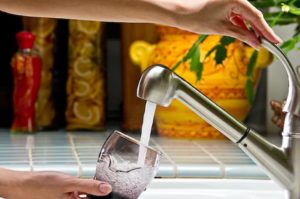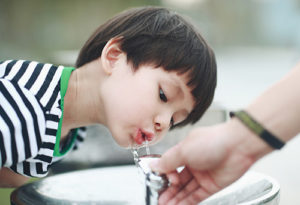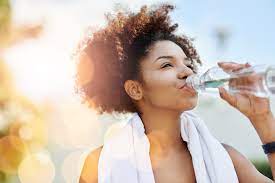There are many options for what to drink, but water is the best choice for most people who have access to safe drinking water. It is calorie-free and as easy to find as the nearest tap.
Water helps to restore fluids lost through metabolism, breathing, sweating, and the removal of waste. It helps to keep you from overheating, lubricates the joints and tissues, maintains healthy skin, and is necessary for proper digestion. It’s the perfect zero-calorie beverage for quenching thirst and rehydrating your body.
- The National Academy of Medicine suggests an adequate intake of daily fluids of about 13 cups and 9 cups for healthy men and women, respectively, with 1 cup equaling 8 ounces. [1] Higher amounts may be needed for those who are physically active or exposed to very warm climates. Lower amounts may be needed for those with smaller body sizes. It’s important to note that this amount is not a daily target, but a general guide. In the average person, drinking less will not necessarily compromise one’s health as each person’s exact fluid needs vary, even day-to-day.
- Fever, exercise, exposure to extreme temperature climates (very hot or cold), and excessive loss of body fluids (such as with vomiting or diarrhea) will increase fluid needs.
- The amount and color of urine can provide a rough estimate of adequate hydration. Generally the color of urine darkens the more concentrated it is (meaning that it contains less water). However, foods, medications, and vitamin supplements can also change urine color. [1] Smaller volumes of urine may indicate dehydration, especially if also darker in color.
- Alcohol can suppress anti-diuretic hormone, a fluid-regulating hormone that signals the kidneys to reduce urination and reabsorb water back into the body. Without it, the body flushes out water more easily. Enjoying more than a couple of drinks within a short time can increase the risk of dehydration, especially if taken on an empty stomach. To prevent this, take alcohol with food and sips of water.
- Although caffeine has long been thought to have a diuretic effect, potentially leading to dehydration, research does not fully support this. The data suggest that more than 180 mg of caffeine daily (about two cups of brewed coffee) may increase urination in the short-term in some people, but will not necessarily lead to dehydration. Therefore, caffeinated beverages including coffee and tea can contribute to total daily water intake. [1]
Keep in mind that about 20% of our total water intake comes not from beverages but from water-rich foods like lettuce, leafy greens, cucumbers, bell peppers, summer squash, celery, berries, and melons.
Aside from including water-rich foods, the following chart is a guide for daily water intake based on age group from the National Academy of Medicine:









